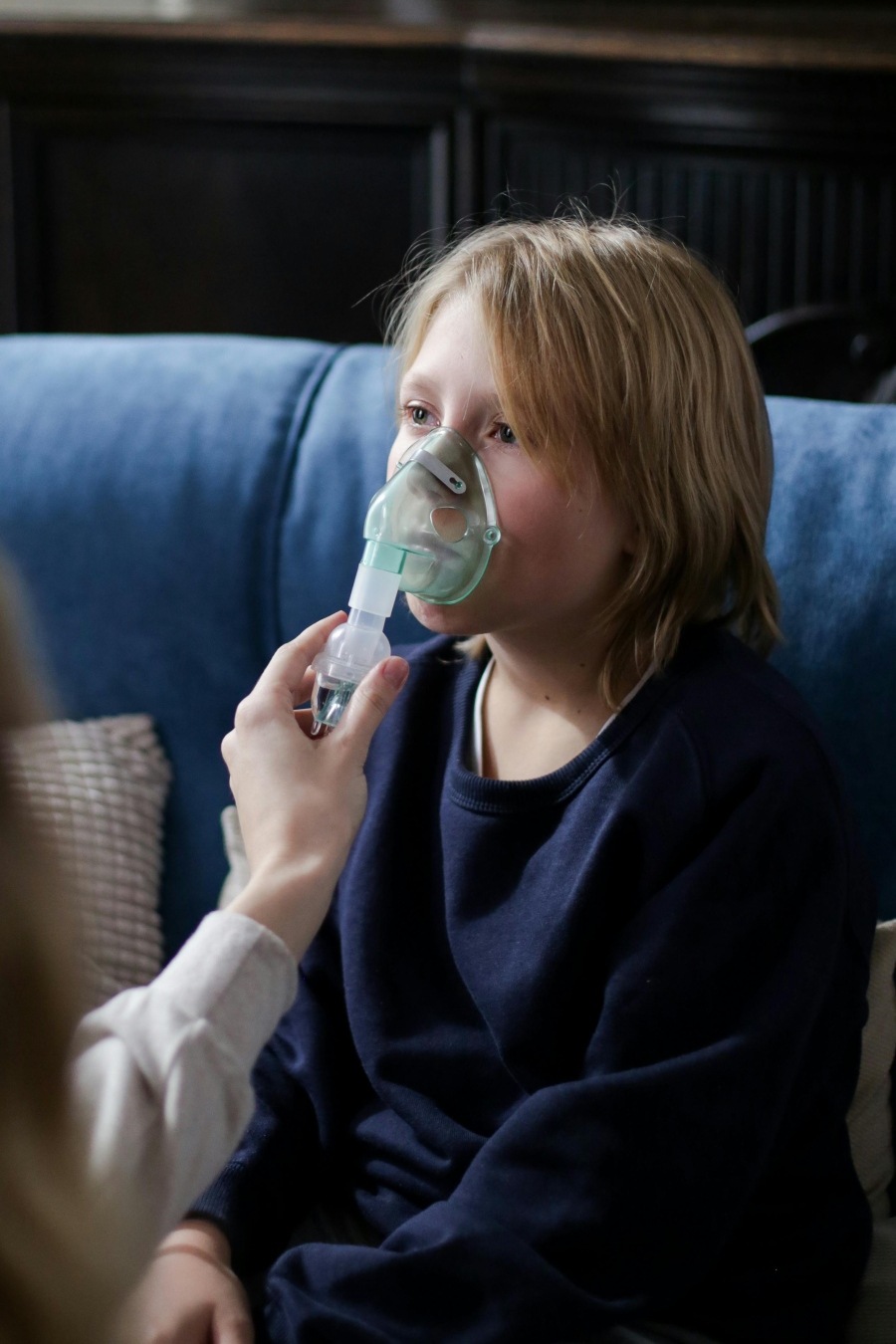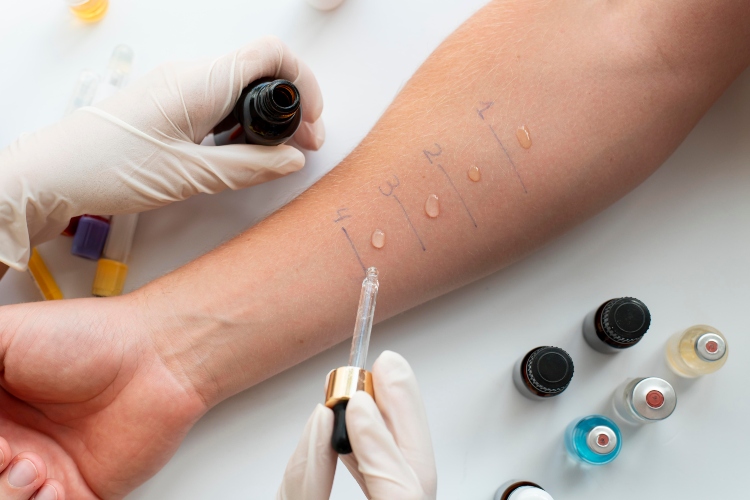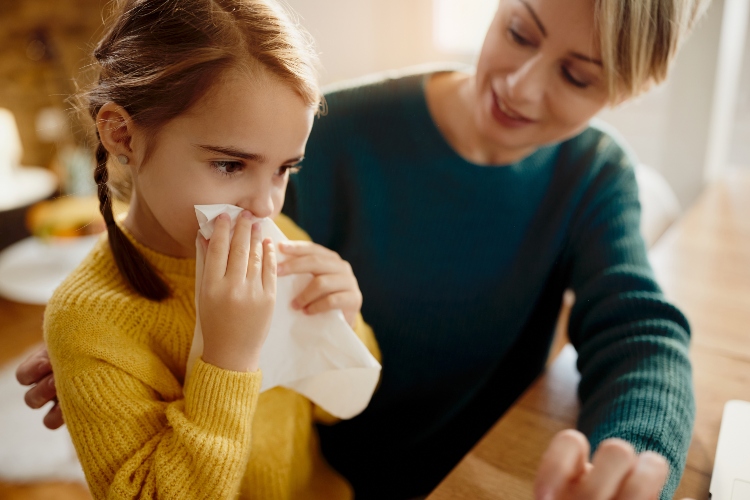
Childhood allergies can be scary and overwhelming. When your son or daughter starts to exhibit signs or symptoms, it’s hard not to worry and wonder how best to manage it.
Whether it’s constant sneezing, a sudden rash, or a reaction to certain foods, allergies in children can affect their daily comfort, health, and even their ability to enjoy everyday activities.
At Pacific Allergy, our goal is to help parents in Orange County, CA, understand childhood allergy symptoms, available treatments, and what to expect long-term—so you can make confident decisions about your child’s care.
Understanding Childhood Allergies
Childhood allergies happen when the immune system reacts to foreign substances it comes into contact with. While usually harmless, they can pose a significant threat. These can include:
- Pollen
- Foods
- Insect Stings
Instead of ignoring these substances, the immune system treats them as threats, triggering an allergic response. Some children may develop mild reactions like a runny nose or watery eyes; others can have more severe, even life-threatening, reactions. Early identification and treatment are essential to managing allergic diseases and preventing complications.
Understanding Childhood Allergies
Children can develop allergies to a variety of triggers, including:
- Food allergies – Common culprits include peanuts, tree nuts, fish, shellfish, eggs, and milk.
- Environmental allergies – Caused by pollen, dust mites, pet dander, and mold.
- Insect stings – Bees, wasps, and ants can trigger allergic reactions, sometimes leading to anaphylaxis.
- Allergy asthma – A condition where allergic reactions lead to inflammation in the airways, causing breathing difficulties.
- Atopic dermatitis – Also known as eczema, this causes red, itchy skin patches.

Recognizing Childhood Allergy Symptoms
Not all allergic reactions look the same. Some symptoms appear immediately, while others develop over hours or days. Being able to identify symptoms early can help you respond quickly.
Respiratory Symptoms
- Persistent runny nose or nasal congestion
- Sneezing and watery eyes
- Coughing, wheezing, or shortness of breath
- Signs of allergic rhinitis, such as nasal itching and postnasal drip
Skin Symptoms
- Red, itchy rashes (often linked to atopic dermatitis)
- Hives or swelling
- Dry, scaly patches
Gastrointestinal Symptoms
- Stomach pain, cramping, or nausea
- Vomiting or diarrhea
- Issues in the gastrointestinal tract after eating certain foods
Severe Allergic Reactions
In rare cases, children may experience anaphylaxis. This severe reaction can cause a sudden drop in blood pressure, difficulty breathing, and loss of consciousness. This is a medical emergency that requires immediate treatment with epinephrine and a call to 911.

How Children Develop Allergies
Allergies can be influenced by genetics, environmental exposure, and the child’s immune system development. If parents or siblings have allergies, a child’s risk of developing them increases.
Some children may experience symptoms early in life. While others develop allergies later due to repeated exposure to triggers. For example, a child who tolerates certain foods for years may suddenly develop allergic reactions to foods like peanuts or fish.
The Role of Allergy Testing
When symptoms persist or cause significant discomfort, an allergy test is often the next step. At Pacific Allergy, we offer safe, accurate testing for children to pinpoint specific triggers. These may include:
- Skin Prick Tests- Introducing small amounts of allergens into the skin to see if a reaction occurs.
- Blood Tests- Measuring antibody levels to specific allergens.
Accurate diagnosis allows for targeted treatment and reduces unnecessary restrictions on your child’s lifestyle.
Treatment Options for Childhood Allergies
Treatment depends on the type and severity of the allergy, as well as your child’s overall health.
Avoidance Strategies
The first step in managing child allergies is avoiding the allergen when possible. For example:
- For dust mites, use allergen-proof bedding covers and wash sheets in hot water weekly.
- For food allergies, read ingredient labels carefully and avoid cross-contact in the kitchen.
- For insect stings, teach children to stay away from nests and wear protective clothing outdoors.
Medications
Over-the-counter or prescription medications can help control symptoms:
- Antihistamines for a runny nose, sneezing, and watery eyes
- Nasal corticosteroids for allergic rhinitis
- Bronchodilators and inhaled steroids for allergic asthma
- Topical creams for atopic dermatitis
Immunotherapy
For some children, allergy shots or sublingual tablets can help train the immune system to tolerate allergens over time. This approach is effective for pollen, dust mites, and pet dander.

Living with Childhood Allergies: What to Expect
While allergies can’t always be cured, most children can live healthy, active lives with the right management plan. Regular follow-ups, updated action plans, and staying informed are key.
School and Activity Planning
Inform teachers, coaches, and caregivers about your child’s allergies and provide them with emergency instructions if needed. This is especially important for children with life-threatening food or insect sting allergies.
Monitoring Changes
Children’s allergies can evolve. Some may outgrow certain food allergies, while others may develop new ones. Regular re-evaluation ensures that treatment plans remain effective.
Emotional Support
Living with allergies can be stressful for children. Encourage open conversations and provide reassurance that, with the right precautions, they can participate in most activities their peers enjoy.
When to See a Specialist
If your child’s symptoms are interfering with sleep, school, or play—or if they’ve had a severe allergic reaction—it’s time to see a specialist. At Pacific Allergy, Dr. Basen specializes in diagnosing and treating childhood allergies with personalized, evidence-based care.
Our office in Orange County provides a comfortable, child-friendly environment where families can feel confident about the care they receive. We focus on education, prevention, and treatment to help your child feel their best.
Don’t wait for allergies to get worse. Schedule an appointment today to get a clear diagnosis, a tailored treatment plan, and peace of mind. Contact Pacific Allergy and let Dr. Basen help your child breathe easier, feel better, and enjoy life to the fullest.


